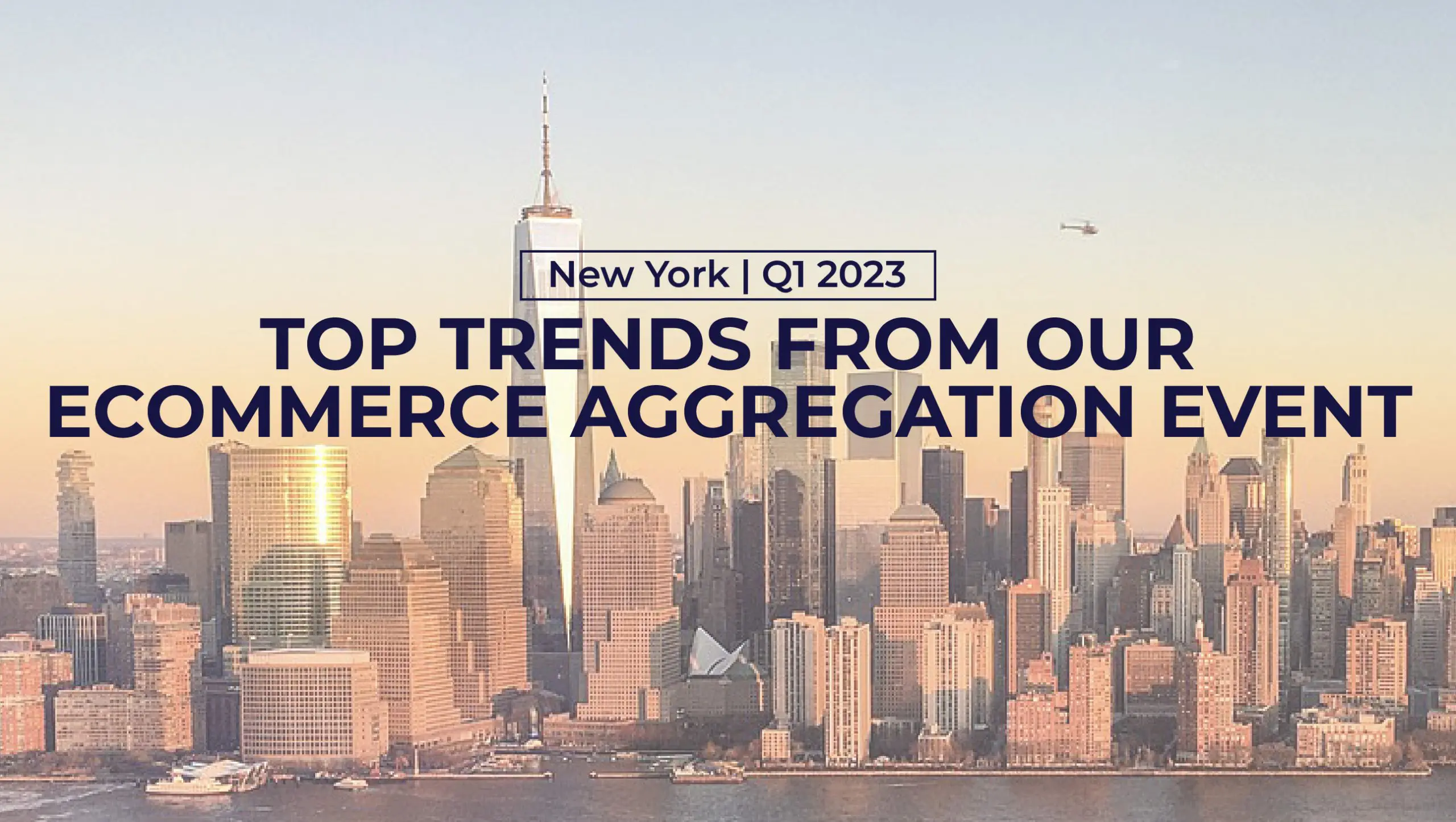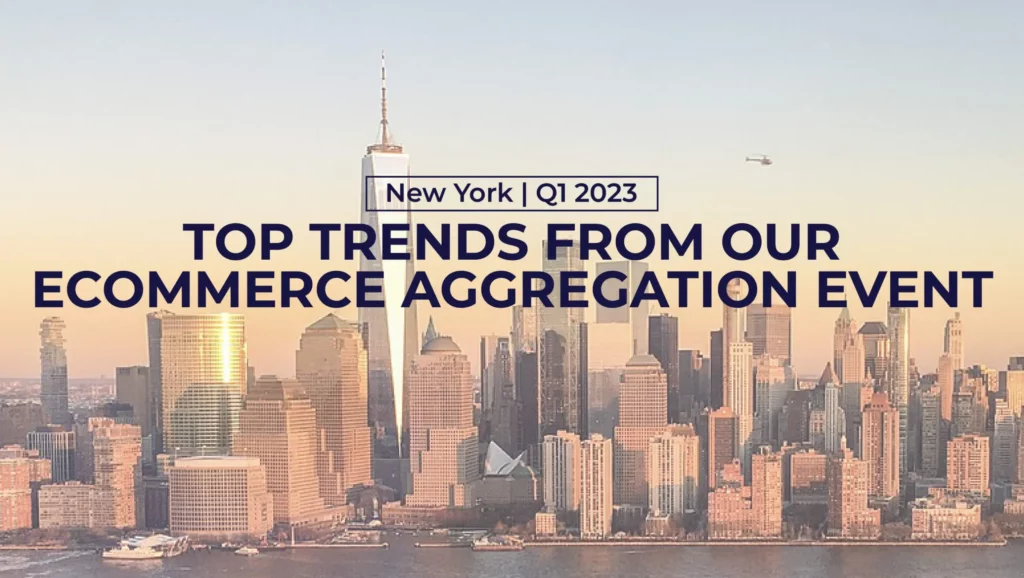Key Takeaways From The eCommerce Acquiror Conference – NY 2024
Summary
Our 2024 eCommerce Acquiror Conference took place Jan 16th in New York, hosting eCommerce acquirors and eCommerce operational experts from around the world. The agenda was to discuss key trends driving eCommerce valuations and discuss operational areas within eCommerce acquirors. We thank our title sponsor Airwallex and all our other sponsors for making this great event a success and we look forward to seeing you all and some new faces at our next annual eCommerce Acquiror Conference.
1.eCommerce Environment
Participants: Furhaan Khan at UBS, Bill Pecoriello, CEO at Consumer Edge.
Key Takeaways:
- UBS and Consumer Edge kicked off discussions reviewing the macro landscape impacting eCommerce valuations.
- Based on public company comparables, eCommerce valuations have softened. Consumers spend is forecasted to transition from post covid high sectors such as travel however consumer spend in general remains subdued by caution towards inflation and interest rates.
- Medium view (2025-2027) is that M&A volumes will be expected to increase once again as inflation starts to curb and the cost of capital stabilizes.
2.Acquirors
Participants:
Session 1 Panellists:
-
- Philipp Triebel, CEO at SellerX.
- Mark Goldfinger, VP of Growth at unybrands.
- Ben Cogan, Co-Founder at Agora.
- Insight provided separately by Tushar Ahluwalia, CEO of Razor, who have a successful record in consolidation of aggregators [Stryze & Valoreo].
Session 2 Panellists:
- WTB Co-CEOs, Jaschar Hupperth and Nicolai von Enzberg.
- Olsam Group Co-Founders: Ollie and Sam Horbye.
Key Takeaways:
- Announcing 2 New Mergers Of Aggregators: The Fortia Group was proud to announce the merger of We The Brands and Mantaro Brands, two German based aggregators, a deal that The Fortia Group had been appointed M&A advisors.Weeks before the conference the eCommerce world learned about the successful merger between Olsam Group [UK based] and Dwarfs [NL based].It was noted that while these are logical strategic moves and something many in the aggregation space will be considering, these deals do take longer due to the complex nature of appeasing a larger group of shareholders. Deal timelines were from 6 to 12 months in duration.
- Consolidation (MoA) and Acquisition Trends: Acquirors in the space are communicating more discussing topics and solutions to issued being created. Consolidation within the market is an important topic.The macro implications of cost of capital in the current environment consolidation are a lot more complex than straight M&A due to the fact they are share deals with limited cash changing hands.The main reason for consolidations are as follows:
- Strengthening Balance Sheet
- Scale
- Cash
- Leverage
- Group EBITDA
- Challenges of Market Conditions: Panellists discuss the challenges faced over the past year, including lower consumer spending due to inflation, pressure on margins, the rise in interest rates, and the general move towards a survival mode among companies.
- Direct-to-Consumer (DTC) Focus: The preference for DTC over Amazon (FBA) due to control over customer data, customer support, marketing, and the overall customer experience (CX) is emphasized.Amazon remains a focus, but many are becoming more interested in diversifying into DTC or gain back more control through this channel, particularly as increasing Amazon operational fees are forecasted for 2024.
- Integration of AI and Technology: eCommerce players have a range of tools available to help them achieve success in the markets.AI is delivering solutions for cost savings removing resource requirement on content, customer service benefits by reducing SLA’s pricing and demand planning.
3.Acquisitions
Participants: Alex Lukashov, CEO at Fintent, Muddy Mat, Johannes Rossner [on behalf of Alpin Loacker and BBG), Daniel Mc Carthy, Co-Founder at Theta, Paul Hanley, Co-Founder at The Fortia Group and Withum CPAs.
- Our Shark Tank Brands Were A Big Success:
- Introducing Muddy Mat – Impressive omnichannel pet brand coming to market in Q1 2024. Matthew, Andrew and Ikho gave a fantastic demo and financial performance overview of the brand.
- Alpin Loacker – EU based tech hiking clothing and equipment omnichannel brand.
- Berlin Brands Group – US portfolio. BBG wish to refocus efforts and as such are open to offers for their current US portfolio.
To learn more about any of the above deals, please contact The Fortia Group directly.
- Daniel Mc Carthy, Co-Founder at Theta educated the crowd on valuations with this talk on “Uncovering Hidden Valuation Insight through Predictive Customer Value Analysis”, followed by a poll on current valuations observed in the market.
Poll no.1: What is the typical valuation range you are seeing for profitable Amazon FBA led brands?
- Average valuation range: The average lower bound of the valuation range is approximately 2.86x, and the average upper bound is approximately 4.13x.
- Lowest valuation range: The lowest valuation range given was 1x.
- Highest valuation range: The highest valuation range provided was 8x
- Please note all valuation ranges are EBITDA multiples.
Poll no.2: What is the typical valuation range you are seeing for DTC led brands?
- Average valuation range: The average lower bound of the valuation range is approximately 3.78x, and the average upper bound is approximately 6.06x.
- Lowest valuation range: The lowest valuation range given was 2x.
- Highest valuation range: The highest valuation range provided was 12x.
- Please note all valuation ranges are EBITDA multiples.
- Paul Hanley, Co-Founder at The Fortia Group brought the audience through the firms new Buy-side diligence offering. The Fortia Group have been servicing investors and credit funds but are now formalizing their Buy-side diligence offering, a rapid initial target screen, to learn more please contact The Fortia Group directly.
04.Value Creation
Participants:
Will Holtz, Head of Operations at SourceMedium
Daniel Mc Carthy, Co-Founder at Theta
Robert Sperling, CEO at EastWest Basics
Rupesh Sanghavi, Founder & CEO at Ergode
Jim Stine, VP of sales at ShipPlug
Naseem Saloojee, Co-Founder at Carbon6
Kevin Fischer, President At KAPOQ
Bill Tauscher, CEO at Farallon Brands
Balaji Kolli Co-Founder at Saras Analytics
CFO Josh Holley at Bare Performance Nutrition
Jacob Cook, CEO at Tadpull
Heath Barnett, Head of SMB & Growth, North America at Airwallex
Jim Mann, VP of Europe at Getida
Ben Fletcher, CEO at The Mothership
Joseph Falcao, CFO at Orva
Shawn Dougherty, COO at Society Brands
Alex Urdea, Founder at Deep Ocean Partners
Key Takeaways:
- Title sponsor Airwallex spoke about the important of localised payment options and how this was going to be crucial as part of a hyper-localised targeting strategy for eCommerce today and into the future.
- Local payment methods accounted for 77% of transactions worldwide.
- 44% of consumers are likely to trust online shop that offers their preferred payment methods.
- The supply chain panel agreed that the rise of manufacturers going direct to the customer via marketplaces will continue to cause difficulties for eCommerce acquirors. It will be difficult to compete on price, however, as always obsessing over CX, branding and marketing strategy always have their place in combatting this type of competition.
- A common theme throughout value creation talks were the importance of visiting and developing relationship with suppliers globally. Often this can open up different credit terms or cost efficiencies over time.
- Predications for 2024 on supply chain were mixed as we move further from a covid container spike yet current situations in Suez Canal may continue to cause delays and additional cost.
- KAPOQ and Carbon 6 explained that obsessing over performance metrics and investment benchmarking were crucial for brands and operators to double down on, with new Amazon marketplace fees forecasted to hit 2024, operators should be focusing on where they can make savings and efficiencies within the P&L.
- CFO Josh Holley brought this to life with insight into how his brand, Bare Performance Nutrition are optimizing with data support and help from Saras Analytics.
- Scrutinizing costs and ensuring you are setup for future success was a common theme, Bill Tauscher at Farallon Brands explained the importance of agility in retail, the role of eCommerce and marketplaces, and a view on timing when discussing growth plans with big retail.
- Conference Partners Jake Cook, CEO at Tadpull and Daniel Mc Carthy, Co-Founder at Theta discussed the importance of understanding and using data sets to help with prediction analysis or growth forecasting.
Poll no.3: What is your top financial and operational priorities for 2024?
- Become cashflow positive: 45%
- Increase corporate EBITDA margins: 23%
- Revenue growth: 13%
- Reduce leverage: 12%
- Improve inventory turns: 7%
Poll no.4: What is your target for corporate EBITDA by end of 2024?
- Unprofitable: 0%
- 1-5% margins : 20%
- 6-10% margins: 10%
- 11-15% margins: 60%
- 16-20% margins: 10%
Poll no.5: What will drive the biggest valuation (profit multiple on exit / listing) of aggregators?
- Financial profile e.g. corporate EBITDA margin: 15%
- Brands: revenue quantum, growth, net margins: 54%
- Being truly omnichannel: 8%
- Tech & Data competence: 0%
- Scale efficiencies: 8%
- Other: 1%
Need some comments from the finance and operations panel.
Need a comment from an investor in the space [ don’t name Alex Udea].
Need success stories comment, don’t need too much detail on that.
We thank all our sponsors, without them conferences like this would not be possible. We look forward to working closely with you all throughout 2024.
- Airwallex | ConferenceTitle Sponsor
- BigCommerce
- Carbon6
- Eastwest Basics
- Factored Quality
- Getida
- Grips
- KAPOQ
- Saras Analytics
- ShipPlug
- Withum
As we mentioned at the event, this will become an annual event, and together, we look forward to making the next one bigger and better.



